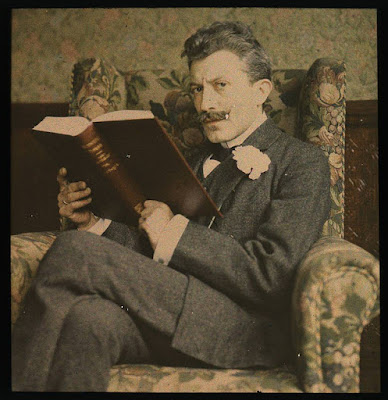 |
| An actual photograph of me reading. |
Iron Gustav (1938) by Hans Fallada
Fallada's Alone in Berlin made my list last year, and this one is almost as brilliant. The eponymous character is the owner of a fleet of cabs in pre-WWI Berlin. His "iron" character is what causes the slow and sure destruction of his family and business over the course of the story, which has to be definitive portrait of Germany in the 1920s and early '30s.
Europe in Autumn (2014) by Dave Hutchinson
This alternate reality/SF novel shows a Europe that's dividing and sub-dividing into smaller and smaller states, all of them throwing up more and more border controls. Did I say this was fiction? It's also wholly, exhilaratingly original and ends with the promise of stranger things (and sequels) to come.
Ghettoside: A True Story of Murder in America (2015) by Jill Leovy
L.A. Times journalist Jill Leovy has been on the crime beat (specifically murder) since 2007, and this book is her answer to the question of why there is so much black on black crime in America. Her reportage on the cops, criminals and hapless bystanders in the city's predominantly black south-central district is never less than fascinating, and her explanation for why the area suffers an unending crime wave is analytically sound and completely fascinating.
Moon in a Dead Eye (2009) by Pascal Garnier
This is a surreal novel in the tradition of Spanish filmmaker Luis Bunuel. A miscellany of retired French folk live in newly opened retirement/trailer park and spontaneously combust, as it were, into various forms of madness as a forest fire sweeps down on the park. Garnier is a master at peeling back the skin of the middle class to show the scary and weird stuff lying underneath.
The Winshaw Legacy, or What a Carve Up! (1994) by Jonathan Coe
This fictional summation of the Thatcher years in the UK is my book of the year. Coe has several axes to grind, and he does so with LOL humor, diabolical plotting, savage characterization, and, dare I say it, a certain brio (read the book and you'll spot the joke in that last sentence.).
The Cartel (2015) by Don Winslow
What makes this all-encompassing novel about the narcowars in Mexico so compelling is that Winslow gives us fully rounded Mexican characters. This subject area is usually dominated, in dramatic terms, by American characters doing all the heavy lifting (see Sicario). Winslow doesn't let the reader forget that it's Mexicans who suffer most from the cartels' predatory actions.
Days Like These (1985) by Nigel Fountain
A shambolic mystery-thriller is usually not a good thing, but in this case it works beautifully. The hero is John Raven, who has a cool name, but is a decidedly uncool hack who lives and works in left-wing political circles. Raven stumbles on a right-wing conspiracy and the fun begins; the fun being a sly and droll look at life on the political edges, played out in grimy bedsits and questionable pubs.
Cuckoo Song (2014) by Frances Hardinge
Fairy lore gets a reboot in this YA novel about a young girl who's been stolen by fairies. These fairies aren't a pack of Tinkerbells. They're dangerous, capricious, and yet not entirely evil. Hardinge's prose, as usual, is brilliant, and her world-building puts her at the top of the class in fantasy writing.
Five Children on the Western Front (2014) by Kate Saunders
Another YA novel, but this one has a title that sounds like a Monty Python skit. It's anything but. Saunders follows E. Nesbit's beloved characters into the First World War and what results is a novel that honours the source material as well as dealing out a harsh anti-war message.
Gun Street Girl (2014) by Adrian McKinty
The fourth D.I. Sean Duffy mystery is as strong as the previous three. The secret to their success is that in Sean Duffy we have a sleuth who actually enjoys (most of the time) what he does. He even likes a lot of his fellow coppers. This is very much against the grain for most contemporary cops who bitch and whine endlessly about their jobs, pausing only briefly to allow their significant others to bitch and whine about police work. McKinty keeps threatening to end this series, but I think he, like Duffy, enjoys the work too much to do that.
No comments:
Post a Comment